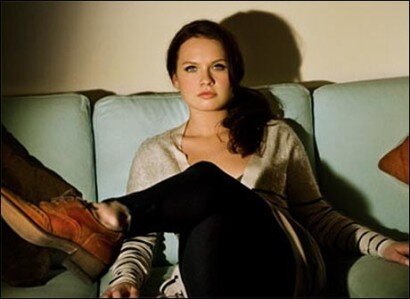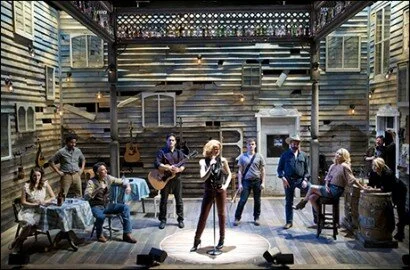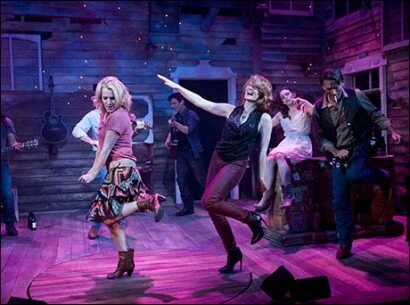"You Are Actually in Charge" — Lauren Pritchard On Graduating from Actor to Creator With Her Off-Broadway ‘Songbird’
Lauren Pritchard
Originally published on Playbill.com
View this story online
"The Spice Girls are my coping mechanism," Lauren Pritchard said matter-of-factly. This admission might come as a surprise to those who know Pritchard from her songwriting career as Lolo, a singer-songwriter of evocative, soulful music, or from her moving performance as the abused runaway Ilse in the 2006 Broadway production of Spring Awakening.
In a marked contrast from her previous work, Pritchard is now bringing country music to the stage in the new musical Songbird, an adaptation of Anton Chekhov's The Seagull, set in Nashville, TN. The musical follows Tammy, a country singer who returns to the town where she first began her ascent to fame to assist her son in launching his career. Pritchard wrote the music and lyrics for Songbird, and Michael Kimmel wrote the book, while the world-premiere production's cast features Ephie Aardema, Kate Baldwin, Adam Cochran, Erin Dilly, Don Guillory, Drew McVety, Eric William Morris, Kacie Sheik, Bob Stillman and Andy Taylor.
Describing the show, Pritchard said, "You have these people who don't necessarily know how to deal with their own lives, with their real words. But with music, they find a way to deal, whether that's coping or hiding. I want the people who come every single night [to be] able to see that these people are able to find one way of dealing with their lives, which was music."
The cast of Songbird
Photo by Jenny Anderson
Songbird marks two firsts for Pritchard, who began writing music as a teen. She had never before composed country or bluegrass music, nor had she written a complete stage musical. It also marks a first for producer Allison Bressi, who shared how the production resonates with her and how its impact has affected how she views her own management and leadership.
"I think it's the first time that I've done something where I've felt this passionately about it and am willing to be more vocal about how I feel about things," Bressi said. "It's a commitment you have to make every day to get up and figure out how to do the right thing — even if you don't know what the right thing is — then listen to the person who does. It's been a really interesting...I hate the word journey, but I'm going to use it."
Being a member of a creative team, and sitting behind the table in rehearsal rooms, has been a change for Pritchard, who, when composing music, has always worked independently."In my own personal music career life, it's always been me. I've been totally in control," Pritchard said. "I don't have an issue being the boss. But my life in theatre for a long time existed as me being an actress, not on this side of the creative table. I've always wanted to be doing this now, and I actually have to remember that I'm in charge — 'You are actually in charge. It's actually OK.'"
Pritchard has been aware of the responsibility that comes with being a young woman and an artist — as well as the limitations that can come with both. One repeated frustration she has experienced is feeling like she has to exaggerate her feelings in order to be understood as a writer.
"A man can write whatever he wants to write. It doesn't matter. As a woman, you have to be overly angry or overly sad… Why?" she asked. "Why can I not just declare my feelings as my feelings? Because if you do this, you're a b*tch, or if you do this, you're on your period. No, I am just feeling these feelings. It's this frustrating balance.
"I have not had to do that with [librettist] Kimmel," she continued. "All of my feelings and creating this world — there didn't have to be a larger explanation. He completely understood. And that is a relief to me. It was nice to just focus on the work and not have to worry [about] bullsh*t."
Both Pritchard and Bressi are conscious of the responsibility that comes with being a woman in charge in a male-dominated industry. Pritchard, who described working on Songbird as a positive experience in which everyone has been respectful to her, said, "I haven't had moments when people have been a certain way or spoken to me because I'm a young woman. But outside of my Songbird experience, I deal with a lot of bullsh*t. And I'm not the only one that does. It's a man's world."
She went on to describe the dynamic between Kimmel and herself as being the mother and father of the Songbird family and being conscious of the examples they set for the rest of the team.
Another unique aspect of Songbird that both Bressi and Pritchard take pride in is the depiction of women as authoritative sexual beings. "I think the play also sets the tone for that. If you see the play and you read Michael's writing, the really good roles are women in their mid 40s." Going on to describe Songbird's leading ladies, she added, "They're women who are mothers, who are sexy. Erin [Dilly] and Kate [Baldwin] talk about how they never get to play mothers who feel good about themselves," Bressi said.
Erin Dilly, Eric William Morris, Kate Baldwin, Ephie Aardema and Bob Stillman
Photo by Jenny Anderson
"It's a very interesting time to be a woman because we have the most power we've ever had as women in the free world, but it's also conditional," Pritchard added. "And I think it's an interesting time in light of all kinds of subject matter — Planned Parenthood or a woman president or whatever — where the role of female no longer takes on the Betty Draper thing. It just can't anymore. Too many things have changed now. But there's still a boys' club."
"I'm optimistic about what's going to happen later," Bressi said. "You look at a lot of the females in theatre and entertainment you admire who talk about having to be the b*tch. That's the only way you can manage and move up in the world. I've met some of them...who are now starting to find their way as well...and understand why you have to be this way. I think we are in for a transition where women are allowed to be themselves and men just be men and not as these other things. I'm optimistic about the future of that, and a big part of that is this experience."
The experience for Pritchard has been a return to her childhood, when, growing up in Tennessee, music was always playing, and she began expressing herself through words and music, striving for authentic expression.
"My life has been lived through music. Period. My whole life," Pritchard said. "It was my communication device. If you really wanted to know how I was feeling, look at what I was writing about. To be able to then take my experience of growing up through music, trying to make it the outlet for characters in our show for expressing themselves, whether they're sad or happy or drunk or whatever it is they're going through, and make it something that someone else can totally relate to is tricky. But it's also made somewhat easy because the characters and people we're dealing with have real feelings.
"It's not fantastical," she continued. "Heartbreak is not fantastical. Death is not fantastical. Sadness is not fantastical. Longing. All of those things are very, very real. And so to sort of be able to write and write honestly is very helpful more than anything."



